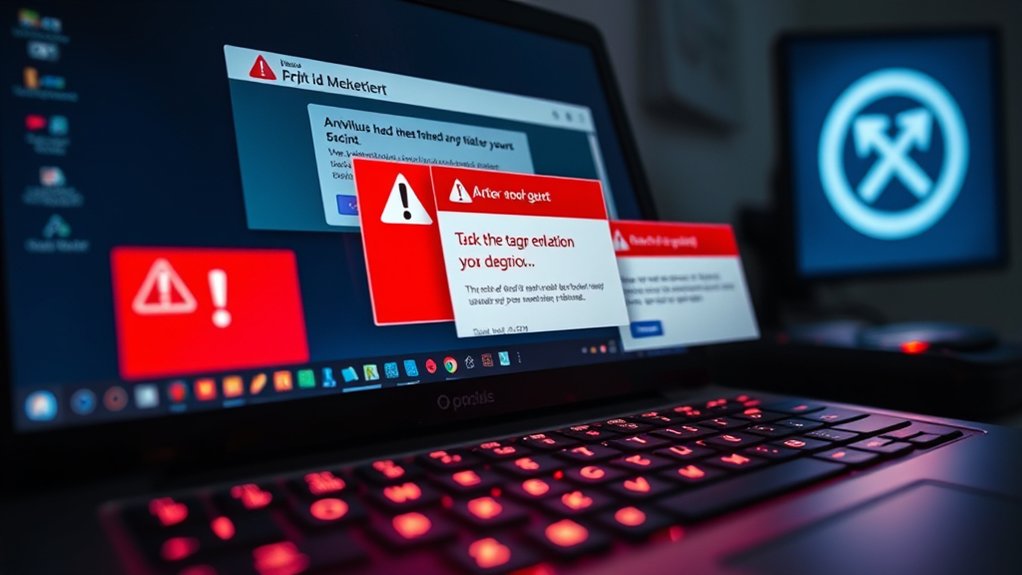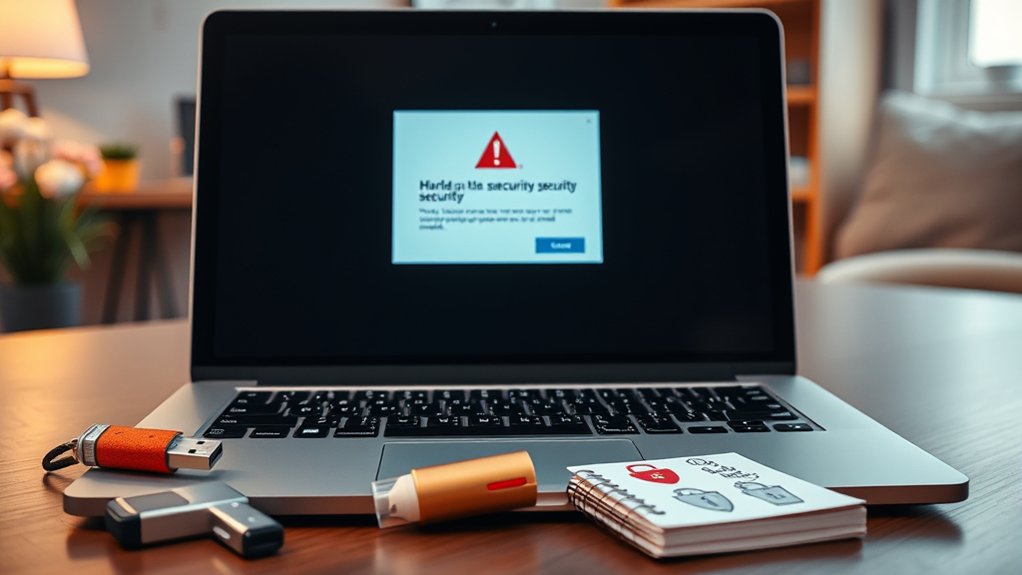To eliminate fake Microsoft security warnings, users should initially conduct thorough antivirus scans with reliable tools, such as Windows Defender, ensuring their software is current. Regularly clearing browser cache and cookies can prevent malicious scripts from persisting. Implementing ad blockers and using VPNs improves security against misleading advertisements and data breaches. Users should educate themselves about scam characteristics, like urgent language demanding immediate action. Awareness and preventive measures are essential; further insights on strengthening security can be found below.

Navigating through the complexities of digital security can be intimidating, particularly when confronted with the proliferation of fake Microsoft security warnings. These counterfeit alerts can create undue anxiety and prompt users to take hasty actions that ultimately compromise their systems. To effectively eliminate fake warnings, users must undertake systematic steps to both remove malware and secure their devices.
First, it is vital to run thorough antivirus scans using reliable programs such as Windows Defender. Regular full-system scans are crucial in identifying and eliminating any malware that may be triggering fake warnings. In addition, ensuring antivirus programs are up-to-date improves defenses against emerging threats, reinforcing security. Moreover, utilizing free PC safety scans is an effective way to detect rogue software and eliminate additional threats. It is essential to recognize that most issues arise from the browser, which can also help pinpoint the source of the problem. Implementing real-time protection is also beneficial in guarding against ongoing threats.
Another preventive measure involves employing ad blockers, which considerably reduce exposure to malicious advertisements known to provoke fake errors. It is equally important to navigate the internet cautiously, avoiding websites that are known to be compromised or unreliable. Utilizing VPNs can also strengthen network security, encrypting data and masking user identity.
When confronted with suspicious messages, recognizing scam characteristics is fundamental. Fake warnings often employ urgent language that demands immediate action, frequently urging users to call specific numbers or pay fees. Legitimate alerts do not request these actions; hence, careful analysis of warning frequencies is advisable.
If performance issues arise or systems lock unexpectedly, this may further indicate malware activity. If cultural browser problems persist, steps such as resetting browser settings or removing dubious extensions can restore functionality. Furthermore, clearing the cache and cookies has been shown to alleviate issues caused by malicious scripts.
Lastly, users should prioritize future protection by updating systems and applications regularly, ensuring their software is obtained from reputable sources. In addition, educating individuals about digital threats promotes an informed user base, reducing susceptibility to scams.
Frequently Asked Questions
What Do Fake Microsoft Security Warnings Look Like?
Fake Microsoft Security Warnings commonly manifest as deceptive pop-ups and alerts resembling genuine notifications.
These warnings employ urgent language, falsely report malware infections, and often request sensitive user information. They may present as browser alerts, alarming emails, or even audio messages urging immediate action.
Scammers typically provide misleading contact details, urging victims to call for support or grant remote access, finally aiming to exploit personal data for financial gain.
Are Fake Warnings Dangerous for My PC?
Fake Microsoft security warnings pose significant risks to personal computers.
Interacting with these deceitful alerts can lead to malware installation, data breaches, and financial loss. According to cybersecurity experts, over 70% of such scams exploit social engineering tactics, leveraging user trust.
In 2022 alone, victims reported losses exceeding $1.4 billion as a result of similar scams. Consequently, users must remain vigilant and avoid engaging with any unsolicited alerts, prioritizing their cybersecurity hygiene to mitigate potential threats.
Can Antivirus Software Detect Fake Security Warnings?
Antivirus software possesses strong detection capabilities to identify fake security warnings.
By utilizing signature detection and advanced heuristic analysis, these programs can flag scareware tactics, often characterized by fear-inducing language and unsolicited demands for user action.
Reports indicate that over 60% of users fail to recognize such scams. As a result, maintaining updated antivirus definitions improves detection efficiency, empowering users to navigate online threats more effectively and minimizing susceptibility to deceptive alerts.
How Often Do Fake Microsoft Warnings Appear?
Fake Microsoft warnings frequently manifest, typically appearing multiple times daily for users engaged in diverse online activities.
Scammers employ sophisticated tactics, leading these warnings to replicate legitimate alerts convincingly.
Research indicates that vulnerabilities in popular web browsers exacerbate their prevalence, as approximately 70% of victims report experiencing these alerts at least once per month.
Experts underscore vigilance; users should prioritize secure browsing and recognize that these warnings often exploit generic threats to instill fear.
Should I Provide Personal Information to These Warnings?
Providing personal information in response to suspicious warnings is highly inadvisable.
Experts assert that such actions may lead to data theft and financial loss. A significant percentage of individuals fall victim to identity theft yearly, with losses totaling millions.
Legitimate alerts will never request sensitive details through unusual channels. Consequently, individuals are urged to remain vigilant, verifying the authenticity of alerts, and to consult official sources before disclosing any personal information.









